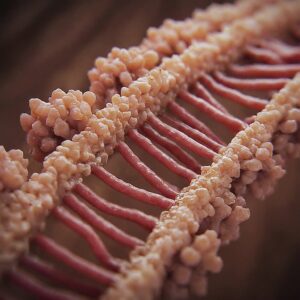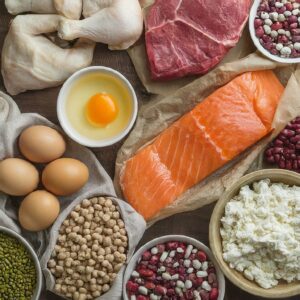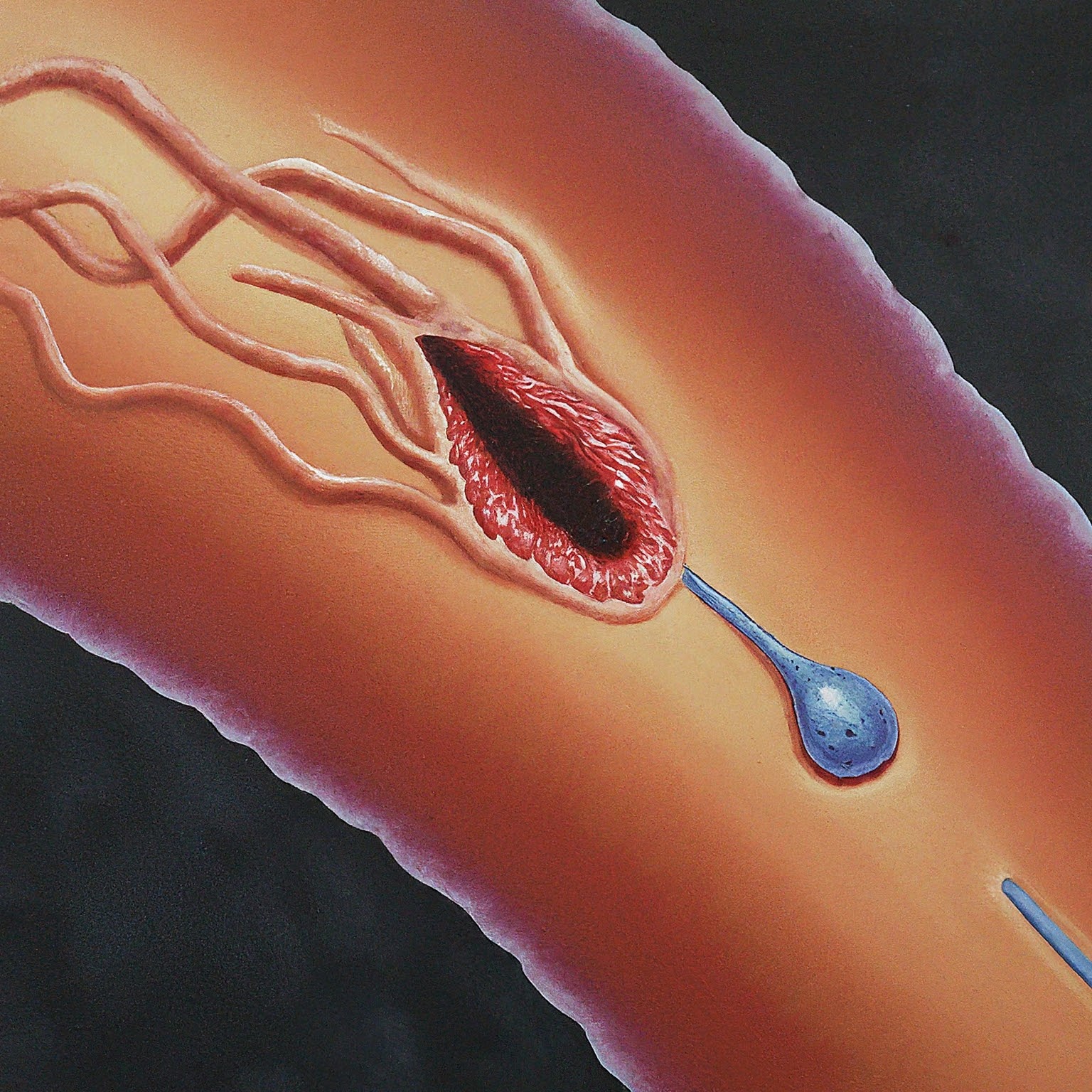Understanding the Importance of Proteins in The Wound Healing Process
Enhancing Your Recovery: The Role of Protein for Optimal Healing
After an injury (cut, burn, or surgical incision), the body initiates a complex wound healing process with distinct stages, each with its specific characteristics and requirements that aim to restore the integrity of the skin and affected tissues.
Proteins play a crucial role in the process of wound healing, from the initial inflammation to the final remodeling of the healed tissue, serving as the building blocks for wound repair and regeneration.
Content table
-
-
- What are proteins and why are they important?
- Recommended daily protein intake for individuals with wounds
- Glutamine and Arginine: What are their benefits in the wound healing process?
- What happens when there is a protein deficiency?
- Where to get enough protein?
- When is protein supplementation needed?
- Takeaway
-
What are proteins and why are they important?
Proteins are an essential macronutrient made up of smaller units called amino acids that join like links in a chain. As humans, we need 20 different amino acids that can be combined in various ways to form a wide range of proteins, each with a distinct shape and function.
They play a role in structural, enzymatic, transport of molecules and regulation of physiological processes. In the context of wound repair, proteins are essential for:
- Collagen synthesis: Collagen is the main structural protein in the body, providing strength and support to tissues such as skin, tendons, and bones. Proteins from the diet provide the amino acids, such as glycine, proline and hydroxyproline, that act like the raw materials and tools needed for the collagen construction.
- Cell proliferation: Proteins are necessary for the division and multiplication of cells, an essential process for the growth and repair of damaged tissues.
- Nutrient transport: Proteins transport amino acids, oxygen and other essential nutrients to healing cells, providing them with the elements necessary for repair.
- Immune function: Proteins are essential for the proper functioning of immune cells, enabling them to effectively remove debris and pathogens from wounds and create a favorable environment for tissue repair.
Recommended daily protein intake for individuals with wounds
For individuals with wounds, the recommended daily protein intake is higher than normal. This will depend on factors such as the size and severity of the wound, as well as the individual’s age, gender, and overall health status.
Different guidelines recommend consuming 1.2-1.5 grams of protein per kilogram of body weight per day for optimal wound healing. However, it’s important to consult with a healthcare professional to determine the appropriate protein intake for your specific needs.

Glutamine and Arginine: What are their benefits in the wound healing process?
Glutamine and arginine are two amino acids that play critical roles in various physiological processes, including wound healing. Glutamine is the most abundant amino acid in the body and is essential for immune function and cell proliferation. Arginine, on the other hand, is involved in wound closure, collagen synthesis, and improving blood flow.
Role of Glutamine in the wound healing process:
- Immune function: Glutamine is a key energy source for immune cells like lymphocytes and macrophages, crucial for clearing debris and pathogens in the inflammatory phase of wound healing. Insufficient glutamine levels can impair immune function, potentially delaying healing and increasing infection risk.
- Cell proliferation: Wound healing relies on rapid cell division and multiplication to repair the damaged area. Glutamine is essential for protein synthesis, supporting new cell growth and timely tissue formation at the wound site. It also aids in the synthesis of other amino acids and proteins crucial for tissue repair.
- Gut health: The intestinal lining acts as a barrier against harmful bacteria and plays a crucial role in nutrient absorption. Glutamine supports the health and integrity of the intestinal lining, ensuring the body absorbs essential nutrients needed for optimal healing.
Roles of Arginine in the wound healing process:
- Improved blood flow: Arginine is a precursor for nitric oxide, which widens blood vessels and increases blood flow, delivering oxygen and nutrients to the wound site, crucial for healing. Nitric oxide facilitates the removal of waste products and debris, creating a more optimal environment for healing. Arginine also stimulates fibroblast migration, aiding in collagen production and tissue repair.
- Collagen synthesis: As mentioned above, collagen is the main structural protein in skin and tissues, crucial for strong scars. Arginine is a precursor for proline, an amino acid needed for collagen synthesis, directly contributing to new tissue formation at wounds. Research indicates that arginine supplementation, especially with other nutrients, can enhance collagen deposition and improve wound healing.
- Wound contraction: Arginine plays a key role in wound healing by stimulating the production of growth factors. These growth factors are essential for wound contraction, which helps to close the wound and reduce its size.
- Immune function and antioxidant properties: Arginine acts as a double agent in wound healing. On one hand, its antioxidant properties help reduce oxidative stress and inflammation at the wound site. This creates a more favorable environment for healing and reduces the risk of tissue damage. On the other hand, arginine is involved in the production of immune cells and cytokines. These immune system components are essential for fighting off infection, a major roadblock to successful healing.
What happens when there is a protein deficiency?
A deficiency in protein can impair the wound healing process. Without an adequate supply of proteins, the body may not be able to produce enough new tissue to repair the wound. This can lead to delayed wound healing and an increased risk of infection.
Among the consequences of protein deficiency on healing are:
Slow healing: The lack of proteins affects collagen synthesis and cell proliferation, which delays the healing process.
Weaker wounds: Scars that form with protein deficiency are weaker and more prone to rupture.
Increased risk of infections: Protein deficiency can weaken the immune system, increasing the risk of wound infections.
Where to get enough protein?

It is essential to ensure an adequate intake of protein-rich foods and/or supplements to support the wound healing process. You can get enough protein from a variety of dietary sources, such as:
- Lean meats: Chicken, turkey, and fish provide high-quality protein with a good balance of amino acids.
- Seafood: Salmon, tuna, and sardines offer protein along with omega-3 fatty acids, which helps reduce inflammation.
- Eggs: A complete protein source, containing all the essential amino acids your body needs.
- Low-fat dairy products: Milk, yogurt, and cheese offer protein alongside with calcium
- Plant-based proteins: Beans, lentils, nuts, and seeds are excellent choices for vegetarians and vegans.
In addition to protein, maintaining a balanced diet with sufficient calories is crucial for supporting the wound healing process. A diet rich in vitamins, minerals, and antioxidants, found in fruits, vegetables, whole grains, and healthy fats, is essential for overall health and healing.
Also, drinking enough water throughout the day is crucial for tissue regeneration, collagen production, immune function, waste removal, skin elasticity, and for preventing dryness and cracking. Water transports nutrients and oxygen to cells, helps flush out waste products which reduces the risk for infection.
When is protein supplementation needed?
While protein is typically obtained through diet, supplementation with protein and/or specific amino acids, such as glutamine and arginine, may be necessary in certain situations to support optimal wound healing. Some of those situations include:
Malnutrition: Individuals with malnutrition are characterized by insufficient intake or absorption of nutrients, which can negatively affect the body’s ability to heal wounds. Supplementation can help ensure that the body has a sufficient supply of amino acids, necessary for tissue regeneration.
Chronic wounds: People with chronic wounds, such as pressure ulcers or diabetic ulcers, often require a longer healing time and can be more challenging to treat. The protein requirements are higher than those without wounds due to the increased demands for tissue repair. Therefore, protein supplementation can help ensure that they are getting enough protein to support optimal healing.
Surgical wounds: After surgery, the body undergoes significant stress and tissue damage, requiring extra protein to repair tissues and promote healing. During the recovery period, protein and specific amino acids supplementation may be beneficial, especially for individuals who may have difficulty consuming enough protein through their regular diet or for major surgeries.
Moderate to severe burns: Severe burns significantly increase protein requirements, in some cases up to 2 grams per kilogram of body weight. Dietary sources alone may not provide enough protein, making supplementation necessary. Protein supplements that offer higher amounts of specific amino acids, such as glutamine and arginine, can help meet the body’s increased needs during the healing process.
Takeaway
The human body’s ability to heal itself is remarkable, particularly in the complex process of wound healing. Proteins are crucial in this process, serving as the building blocks for tissue repair and regeneration. They are essential at every stage, from inflammation to tissue remodeling. Their functions include creating collagen for strong tissues to fueling cell growth.
People with wounds often need more protein than usual, with recommended daily intake ranging from 1.2-1.5 grams per kilogram of body weight. Specific amino acids like glutamine and arginine can further enhance healing by supporting immune function, collagen production, and wound contraction.
To ensure optimal healing, focus on a balanced diet rich in protein from sources like lean meats, fish, eggs, dairy, and plant-based foods, along with adequate hydration.
In cases where dietary intake may be insufficient, protein and specific amino acids supplementation may be necessary. This is especially true for individuals who are malnourished, have chronic wounds, or have undergone surgery or severe burns.
Always consult with a doctor or dietitian about your specific needs and if supplementation might be right for you.



